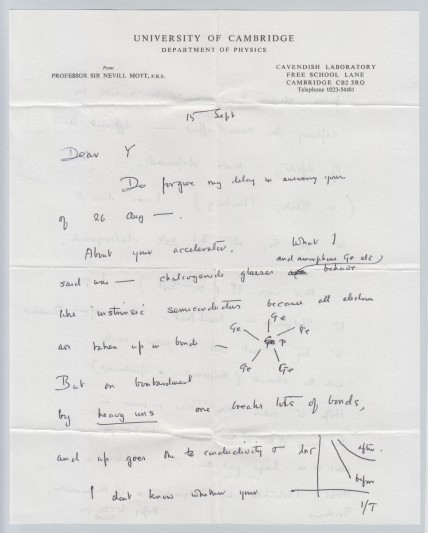Dr Jill Whitelock, Head of Special Collections, writes: Cambridge University Library is very grateful to the Friends of the National Libraries for its generous grant towards the acquisition of a collection of autograph letters from the Nobel Prize-winning physicist Professor Sir Nevill Francis Mott (Director of the Cavendish Laboratory, Cambridge, and Master of Gonville & Caius College) to Yvette Cauchois, a highly eminent physicist who became the second woman (after Marie Curie) to be President of the French Society for Physical Chemistry. The letters cover the period 1948–1996 and provide a richly detailed portrait of Mott writing on his scientific work, especially relating to semi-conductors, scientific administration, personal life, and his intense relationship with Cauchois.
The University Library already holds the principal collection of Mott’s papers and correspondence, some 500 items, with papers on lectures and publications, and family correspondence the most substantial components. The Mott–Cauchois correspondence represents a rich and remarkably detailed complement to this. There are some 750 letters, 48 postcards, six greetings cards and 35 telegrams, covering the period 1948–1996. There are also a small number of retained drafts, copies, and unsent letters by Cauchois, one letter by Mott’s wife, a typescript lecture given at Great St Mary’s, Cambridge, and a small number of other typescripts and other scientific material, and letters relating to Mott after his death. The letters far outnumber the existing papers held at the Library and provide a granular view of Mott’s daily life. At the height of their correspondence, Mott wrote two or three letters a day to Cauchois, so the letters act as a journal of sorts, and are an unmined source of information for researchers across of a range of subjects in the history of twentieth-science science in the post-WWII period, scientific collaboration, science education, and gender and science.
The letters also complement the University Library’s outstanding holdings of scientific archives in physics, including the papers of James Clerk Maxwell (1831–1879), Sir George Stokes (1819–1903), Ernest Rutherford (1871–1937) and the official papers of the Cavendish Laboratory held as part of the University Archives.
